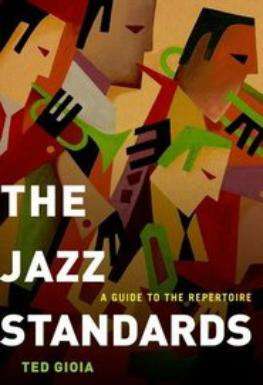|
Back
08/13/2012
The Jazz Standards
Oxford University Press, Hardcover, 544 pg

Ted Gioia is a jazz musician, teacher and author of many books on music, among them The History of Jazz , West Coast Jazz, The Birth (and Death) of the Cool and Delta Blues , so who better to write The Jazz Standards: A Guide To the Repertoire.?
Formatted in encyclopedic style, the book provides capsule histories of the creative circumstances and performance life of each song that comprises the jazz standard rep. Gioia gives practical use to discussion of harmony, rhythm, melody, modals, chromatic lines, and the lyric-music dynamic. Aside from the musicological aspects for a full discussion of the song that may be of only of passing interest for the lay reader, he otherwise packs these entries with entertaining song lore.
As a young jazzman, Gioia realized that “in-depth study of the jazz repertoire is hardly a … sideline, but essential for survival, Gioia writes in the introduction. He is referring to what it takes as a player to maintain many versions of well known songs and be ready for per-gig interpretations and improvisations. His aim is to “to unravel the evolution of these compositions over time.”
Take his entry about the Gershwin brothers classic A Foggy Day, Gioia deftly describes the arc of the song, how its initial somber atmospherics bloom into a luminous love song. Gioia insightfully concludes, “...the composer’s most inspired melodies, especially noteworthy for the quirky final bars, reminiscent of a military fanfare- with echoes of the English folk tune.”
Of Bart Howard’s Fly Me to the Moon, he chronicles its first flight when it was titled “In Other Words” first sung by Nancy Wilson in 1959. Its fame was sealed the following year by Peggy Lee on the Ed Sullivan Show. The song became a huge hit after that and everyone wanted to record it, even with its squirrelly lyrical-music structure. Later the Frank Sinatra-Basie Band version was flown to the moon by Buzz Aldrin on his 1964 lunar mission.
The history of such a classic as Hoagy Carmichael/Mitchell Parish’s Stardust we find out that Carmichael may have been inspired by love but was more concerned with composing a “style of improvisation.” The entry quotes Mel Torme, who kept it in his repertoire his whole career as described that Stardust “rambles up the scale and down” yet is “one of the most bittersweet examples of ‘lost love’ ever written.” He disseminates lots of artistic information, but not at the expense of the mystique.
Gioia covers the range of songs from the beginnings jazz in ragtime, the blues, tin-pan alley, big band, be-bop, cool, Latin with a trunk load of classics from Broadway. His concise, valuable analysis about the pivotal recordings like Duke Ellington’s Mood Indigo for instance being rightly considered in both jazz and classical musical idioms, is an example of his expansive narrative.
Songs by all of the American master songsmiths Cole Porter, Johnny Mercer, Richard Rodgers, Oscar Hammerstein, Harold Arlen, Dorothy Fields, et al. Equal attention is paid to such jazz innovators Ellington, Count Basie, Louis Armstrong, Thelonious Monk, Coleman Hawkins, Horace Silver, among others. Gioia also assesses the impact of indelible performances by Armstrong, Ella Fitzgerald, Billie Holiday, Nat King Cole, Rosemary Clooney, Sarah Vaughan, just to name a few.
Gioia also doesn’t ignore such accomplished underappreciated jazz composers as Wayne Shorter. Shorter is represented in this standards compendium with his 1966 composition Footprints while he was with Miles Davis’ quintet along with Herbie Hancock, Ron Carter and Tony Williams. “Davis sought to establish different rules of engagement, ones that allowed him to find new creative spaces at the limits of-but still within- conventional structures.” Gioia deftly sums up.
Editorially, Gioia’s expertise and authority over the whole spectrum of jazz music and its history is at play in Jazz Standards, he ends each summary with a listing of what he considers the best recordings of the songs.
There are a few inexplicable omissions by Gioia (I looked in vain for I’m a Fool to Want you), so one gripe would be that Gioia explains in the introduction that his selection process was based on the how relevant the songs were now and that strikes as a bit arbitrary. Nonetheless, The Jazz Standards is an invaluable, unique and comprehensive reference.
Lewis Whittington
|